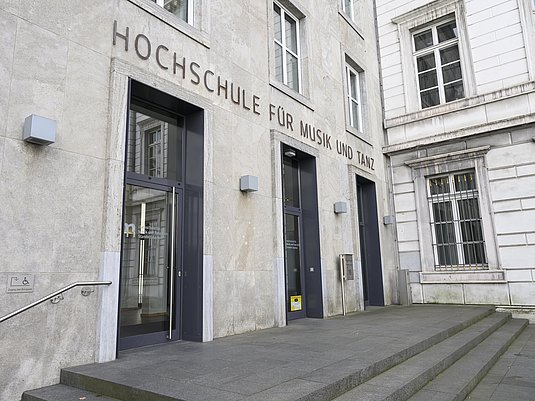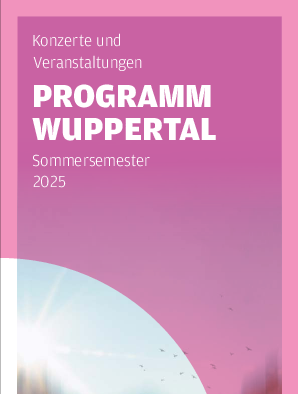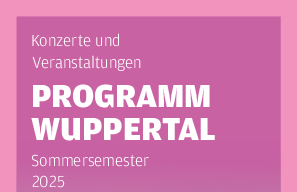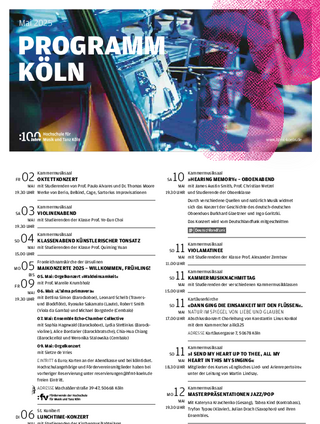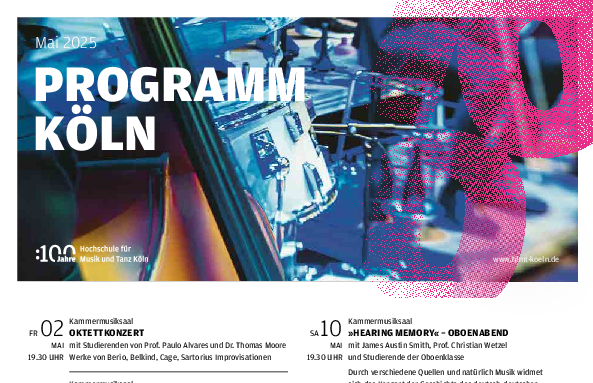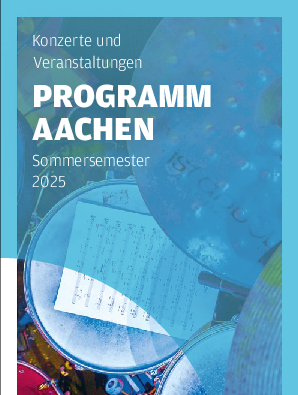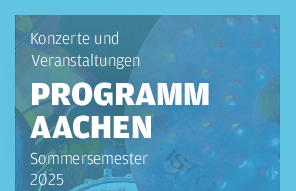Wuppertal
The up and down of the mountains as a refrain
Up and down the mountains that surround the city. Up and down over countless steps. With long arms stretching out and lost at the edge in the green forests and meadows of the Bergisches Land. With the suspension train 8 meters above the streets and on the ground in the evening bustle of the Luisenviertel. To symphony orchestras, operas or dance theater. Wuppertal is full of rhythm.
A little up the river, on the outskirts of the city, you hear another up and down. That of high and low tones. Of quiet reflection and loud music-making. Of quiet melodies and stately sounds. Of violin, clarinet, piano or singing. Of a university full of music and dance.
Site Directorate
| Name | Kontaktdaten |
|---|---|
| Prof. Dr. Florence Millet |
florence.millet@hfmt-koeln.de
|
| Prof. Werner Dickel |
werner.dickel@hfmt-koeln.de
|
| Prof. Dirk Peppel |
dirk.peppel@hfmt-koeln.de
|
| Prof. Dr. Barbara Rucha |
Barbara.Rucha@hfmt-koeln.de
|
Opening hours at the Wuppertal site
01.10.23 - 02.02.2024
01.10.23 - 02.02.2024
- Monday - Friday: 08:00 h till 22:30 h (lessons / practice time till 22:00 h)
- Saturday : 09:00 h till 22:30 h (lessons / practice time till 22:00 h)
- Sunday: 10:00 h till 20:30 h (lessons / practice time till 20:00 h)
Closed
- Day of German Unity | 03.10.2024
- All Saints' Day | 01.11.2024
- Christmas break | 24.12.2024 to 01.01.2025
- Weiberfastnacht | 27.02.2025
- Rose Monday | 03.03.2025
- Easter | 18.04.2025 to 21.04.2025
- Labor Day | 01.05.2025
- Ascension Day | 29.05.2025
- Whit Sunday | 08.06.2025
- Whit Monday | 09.06.2025
- Corpus Christi | 19.06.2025
- Day of German Unity | 03.10.2025
- All Saints' Day | 01.11.2025
- Christmas break | 24.12.2025 to 01.01.2026
Events
Konzertsaal Wuppertal Wuppertal

Konzertsaal Wuppertal Wuppertal

Großer Saal, Historische Stadthalle Wuppertal
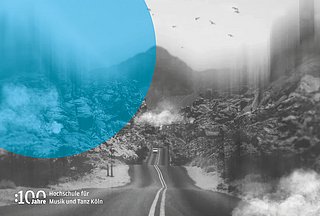
Konzertsaal Wuppertal Wuppertal

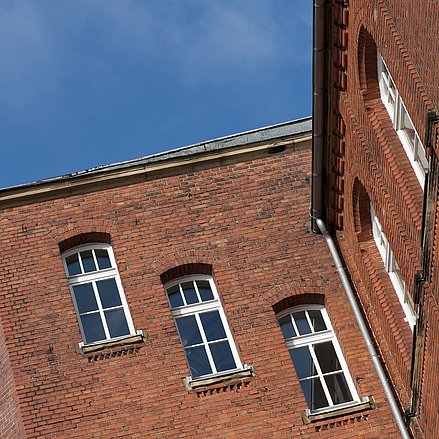
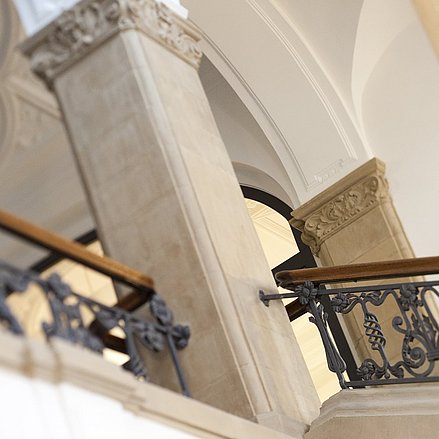
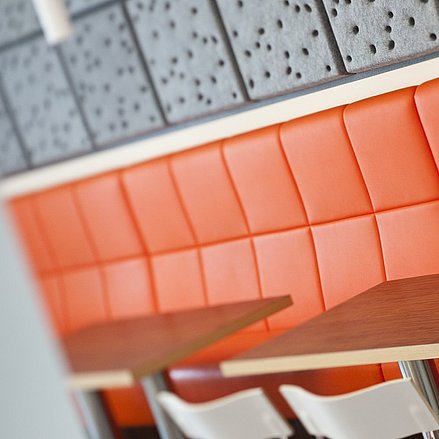
The San Francisco of Germany
This is what Wuppertal is flatteringly called. And rightly so! Because when it comes to mountains and stairs, Wuppertal can hold its own. Instead of the Twin Peaks, the city is surrounded by the many peaks of the Bergisches Land. Plus, there are over 12,000 flights of stairs (recounting is optional).
And what's the best way to move through this hilly landscape? Hovering. 8 meters high above the streets, the suspension railroad glides over the city every day. Some reverently call it the "steely dragon," but in the train itself it rides quite smoothly.
The suspension railroad also runs comfortably along the winding Wupper River to Wuppertal Barmen. There you will find the Wuppertal theaters, the opera house and the city hall. And very close to the city's hustle and bustle, in a listed building full of columns and archways, is the University of Music and Dance.
The locations of the university together offer
Venues
- Three concert halls, two chamber music halls
- One studio theater
- External venues: Urania Theater, Corpus Christi Church of the Ursulines
Technical facilities
- One lighting control room, two sound studios
Classrooms and overrooms
- Six organ rooms, about 90 overrooms, about 170 classrooms, five dance classrooms
Instruments
- 95 upright pianos, 241 grand pianos, instrument loans
Four libraries
Not flutter, float.
Big city in the green
Wuppertal is the city in the green. Strictly speaking, it is even half city, half green. Because more than half of it consists of gardens, fields, parks and woodland. Nestled between mountains, sweeping arms of hiking trails wind their way upward. The list of mountains is long and very poetic. Whether Wollenspinner, Engels or Osterberg, they all offer excellent views. And even down in the city, you can always find a place on the meadow or under trees within a few minutes.
Waldfrieden, by the way, is not just a romantic name here. It's also a mysterious place full of stone sculptures and glass formations in which the sunlight refracts from the canopy of leaves.
Our centerpieces: Pedagogy and practice
In addition to the artistic instrumental and vocal subjects, Wuppertal has a focus on music education. From teaching rehearsals in music classes to the conception of children's concerts to adult education, we offer plenty of opportunities to try things out and gain practical experience while still studying. The Individuale profile allows for individual study paths and prepares students for a changing professional reality. Within the profile, you will find a variety of teaching options that allow for a great deal of flexibility.
Live and study.
Although Wuppertal is so elongated, most students gather in the middle - in Elberfeld or Barmen. There are now more than 20,000 at all of the city's universities, living in more than 16 student dormitories or in the city. Rents are gratifyingly low compared to other large university cities.
Students living in the north of Elberfeld on the Ölberg can often be heard stomping down the Tippen-Tappen-Tönchen in the evening. The best way to understand why the city's most famous staircase is called that is to put on clunky wooden shoes for the steep descent. It leads down to the Luisenviertel. In the morning, you can stroll through the cozy narrow streets, and in the evening you can listen to live music and meet pubs, cafés, art, music and lots of good-humored people.
Important points of contact for students:
- University Social Services-Studentenwerk
- Housing office, administration and accommodation service (apartments and shared apartments in the immediate vicinity of the university are located at Bernhard-Letterhaus-Straße 9 in Wuppertal-Barmen)
Dance, music and culture in Wuppertal
The Wuppertal stages, the famous dance theater Pina Bausch, classical music, jazz, rock, concert hall and forest stage: Wuppertal's culture is large and small, loud and quiet, old and new, but always full of life.
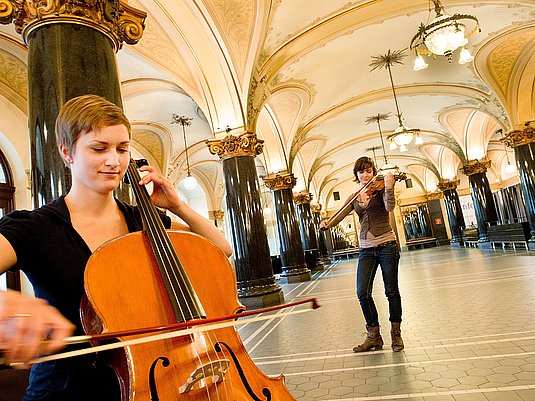
Music
Wuppertal is a city with a rich cultural tradition. The wealthy bourgeoisie of the 19th century laid the roots for a cultural life that still encompasses the most diverse areas today.
A visible sign of this is the Historische Stadthalle am Johannisberg, a building opened in 1900 in the style of the Gründerzeit. The Great Hall - one of the most beautiful and acoustically best concert halls in Europe - is also home to the Wuppertal Symphony Orchestra, one of the best orchestras in NRW.
In addition, there are numerous larger and smaller choirs with different focuses. On the one hand, there are large concert choirs such as the choir of the Concert Society, which regularly works together with the symphony orchestra. But there are also smaller associations stemming from church music traditions, such as the Kantorei Barmen Gemarke, which regularly offers sophisticated performances of sacred music.
Wuppertal also has a tradition in the field of jazz, which has remained alive from the 1960s to the present day and is tangible and concrete in numerous concert series.
Contemporary music has found its promoters in the Bergische Gesellschaft für Neue Musik (BeGNM). In addition to regular concerts, it organizes the Bergische Biennale für Neue Musik every two years.
Dance & Theater
The Wuppertaler Bühnen is a "three-division theater" with opera, drama and the world-famous dance theater Pina Bausch, which without a doubt is not only world-class, but has also made Wuppertal known worldwide as a cultural location.
And who knows that Wuppertal has meanwhile become a center of tango dance in Germany with a large annual tango festival? The so-called "independent scene" shows itself in numerous private theaters such as Müller's Marionette Theater, but also in stages for comedy and cabaret.
Art
With the Von der Heydt Museum, Wuppertal has one of the most prestigious museums of its kind in Europe with a widely respected permanent collection and changing exhibitions.
